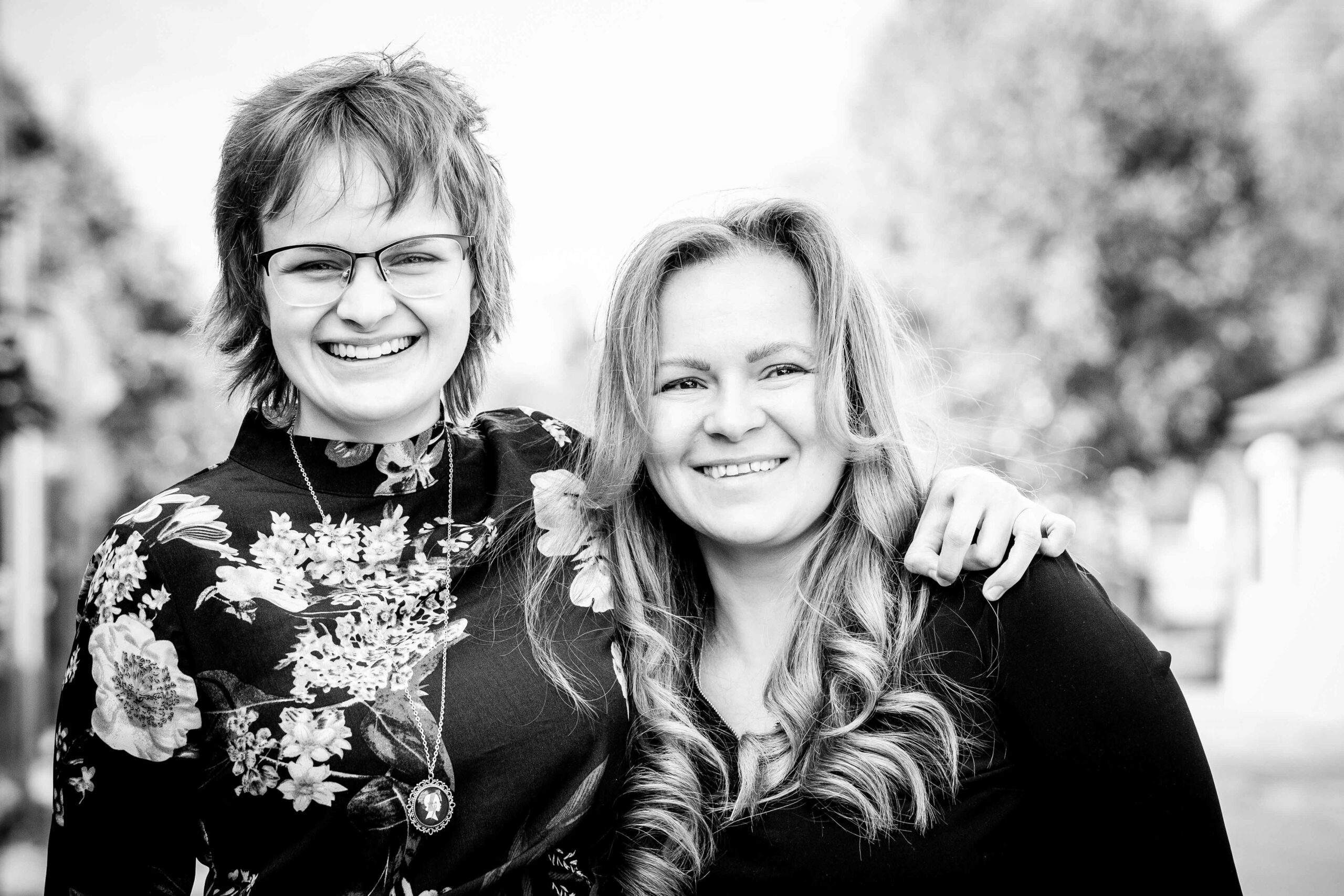Joanna Stoklasek-Michalak (Asia) & Julia Michalak, Museum director & student in Poland
Asia: “For me, matriarchy is a cradle of good values. I’m not saying it has to come back and take over again, but I think it would be good if men stopped fighting ‘on our piece of earth over our piece of earth’. I think that such a cultural symbiosis between different genders is possible. The protests in Kłodzko started in 2015. I joined the protest and grew increasingly furious about the increasing pressure on us as women. Julia was already working on it more intensively then. In 2020, at the start of the pandemic, she participated in the so-called ride-hailing protests. Since it was forbidden to unite and protest openly with several people, the idea was to line up at a store…”
Julia: “I then went to the supermarket. I announced the action in advance, I asked others to come. But I was alone.”
Asia: “Julia received a lot of criticism through our fan page, because we protested during the corona pandemic. We would endanger people with our ridiculous emotional actions.”
Julia: “If someone tries to decide about my womb, including my body and my life, and then says that the pandemic is more important than my self-determination over my body… then I don’t understand anymore. I think my body is my property and not someone else’s.”
Asia: “In Poland, a woman has to be attractively dressed. But if a man attacks and rapes her, then the woman herself is guilty of the rape. She provoked that, she provoked with her attractive clothing. Violence against women is deeply rooted in Polish culture. The man ‘takes care’ of the family, of the food, of money… so yes, that gives him the ‘right’ to beat his wife. And when she is abused, she provoked it.”
Julia: “I think society is polarizing. Women either move towards feminism and then immediately opt for very active feminism or radically opt for patriarchy. The latter group sees a woman as someone who has to give birth to and raise the new heroes for the fatherland. This is their conglomeration of moral values. They want women to stay in this role, but see that women have now been awakened and want to leave this one-sided subservient role. They are afraid of that.”
Asia: “In our society, the man has the right to frustration. If a woman is having a bad day, having problems and not being ‘sweet’, this is literally brought to her vagina: ‘she is definitely on her period’ or ‘she hasn’t had sex in a long time’. We are greatly devalued. Our emotions, experiences and feelings are literally brought to the vagina.”
Asia: “At first I believed very much that our protests would bring about a revolution. But after the police intervened, many pulled out. On the fan page of Women’s Strike in Kłodzko, I got a lot of hate speech. The comparison of the lightning bolt with the logo of the SS. That we are the ‘walking death’. People couldn’t empathize with a woman’s life. I’m getting emotional now because I had a sick child in 2013. I don’t know if if I had known I would have had an abortion. But no one but me has the right to decide this. When I joined the protests, I wanted to prove that we are not for death, but for life! The life of a born child! A sick child stays with the mother who takes care of him. If treatment is possible, it is very expensive. She can’t afford it. This is a symbol of our oppression. The father is allowed to run away because he is no longer psychologically able to take care of a sick child. The mother must stay and bear all the burdens. During the protests, many women sacrificed their lives for the disabled child. Often for a child who cannot be helped and whose life could end at any moment.”
Julia: “It is terrifying what is happening to women’s rights in Poland. I sometimes think ‘if everything goes this way and women get fewer and fewer rights… won’t I enter into a fictitious marriage with my cousin?’ I detest incest, but then I may have a real option to decide about myself. That is a ‘sick’ legislation: I can marry a cousin, but I can’t be sterilized.”
“I notice that there are more and more people who think that the protests are a kind of consumer event. They join when it suits them, when they have nothing else to do. When I got the question via the fan page if we were going to do something, I suggested turning it around: if they want to organize something or come up with a proposal, I’m happy to help… I didn’t get an answer. It seems like protesting is my passion, but it isn’t. I do not like it. I protest because I feel I have to do it in order to do something.”
Asia: “When I realized that the protests won’t do us any good, I lost my enthusiasm. I need listeners. Protesting creates stress. I was stopped twice by the police and I was scared when we took different actions. It was uncertain what would happen to us if we were arrested. I notice that I am slowly getting rid of the fear of the police. I still see the police as a threat…

